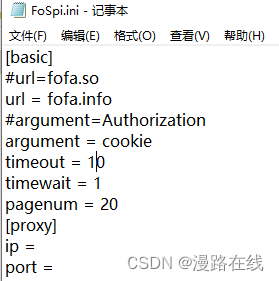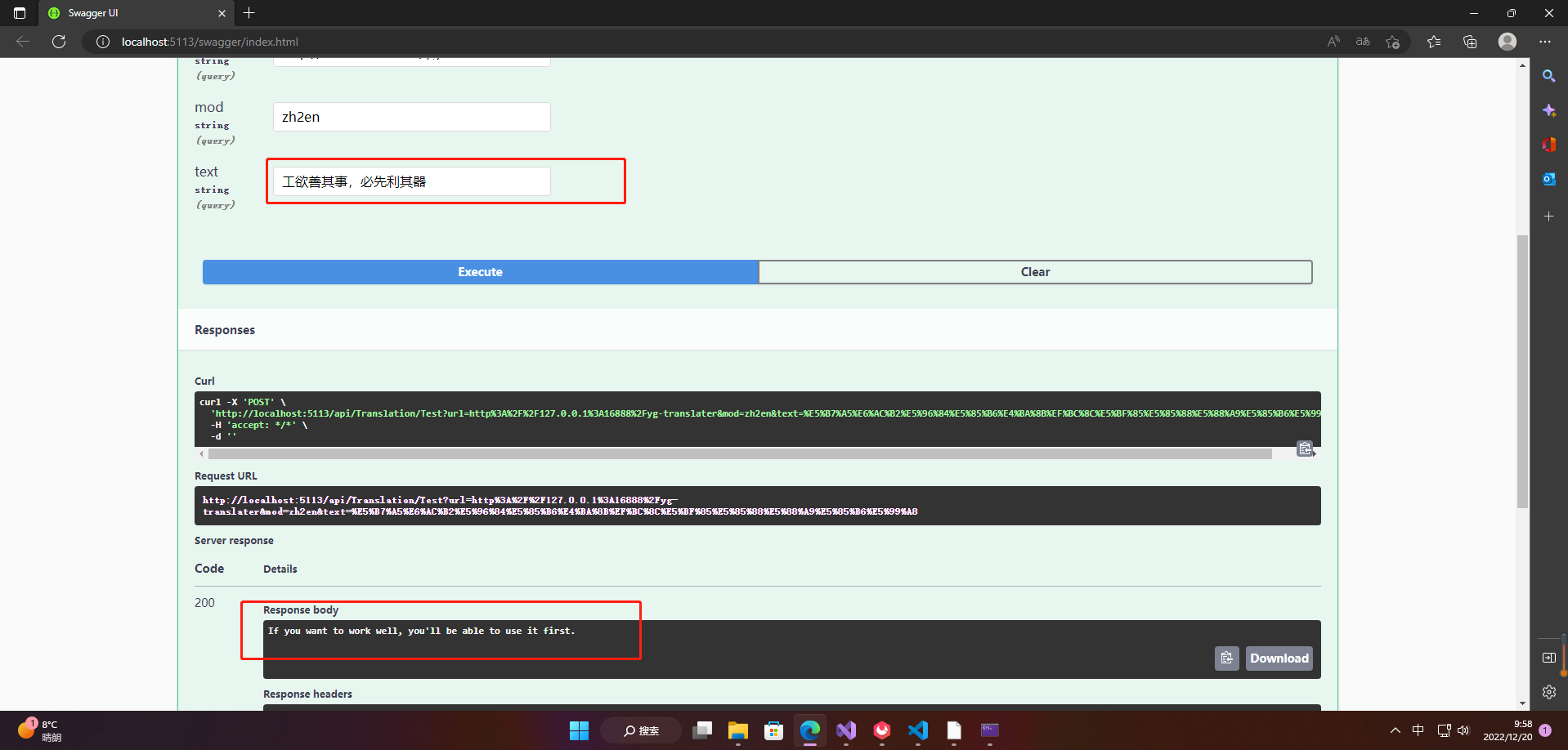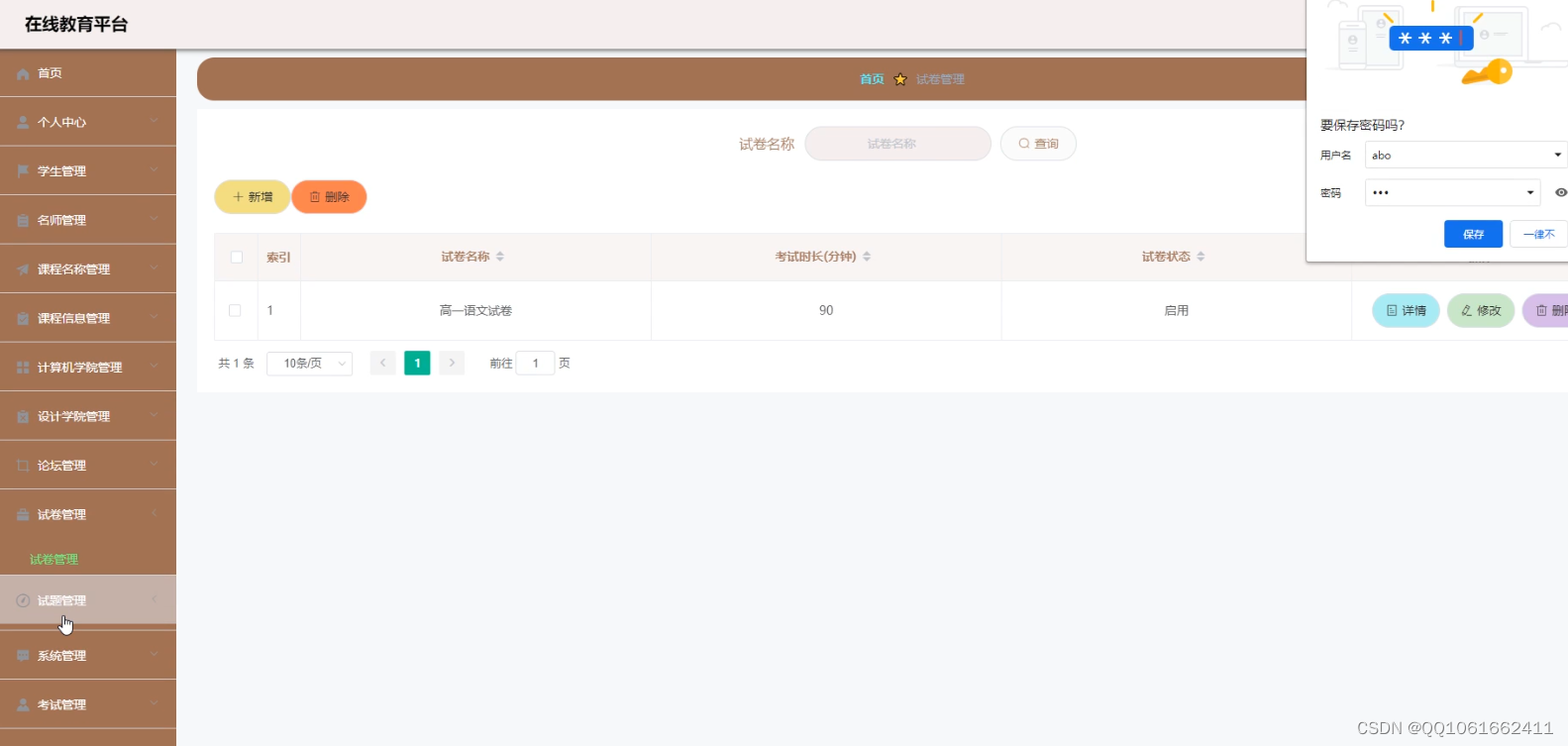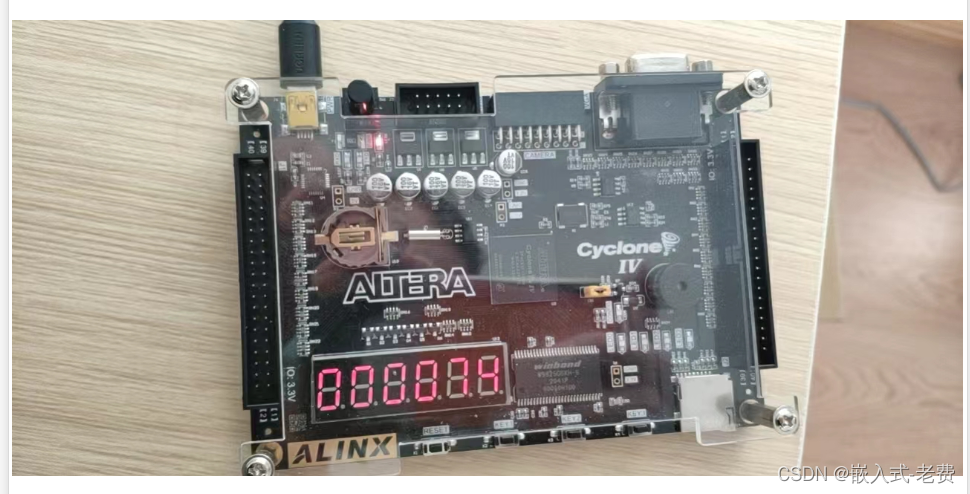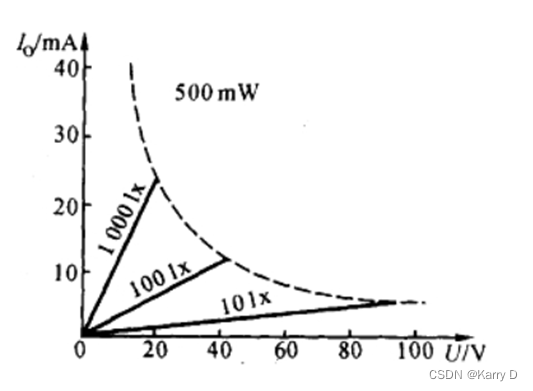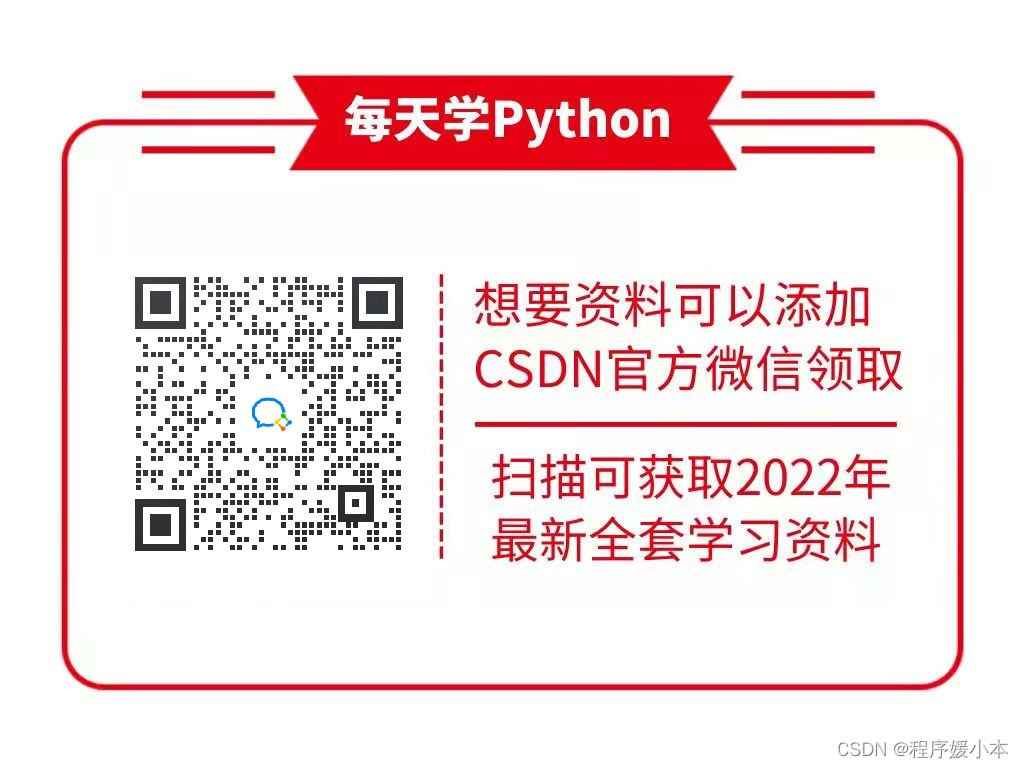文章目录
- 进程程序替换是什么
- 概念
- 原理
- 为什么要进行程序替换
- 如何进行程序替换
- 使用接口
- execl
- 引入进程创建
- execv
- execlp
- execvp
- execle
进程程序替换是什么
概念
通过之前的学习,我们知道子进程执行的是父进程的代码片段。
如果我们想让创建出来的子进程,执行的是全新的程序呢?
这里我们就需要用到进程程序替换。
原理
1.将磁盘中的程序,加载入内存结构
2.重新建立页表映射,谁执行程序替换,就重新建立谁的映射(子进程)
效果:让我们的父进程和子进程彻底分离,并让子进程执行一个新的程序。
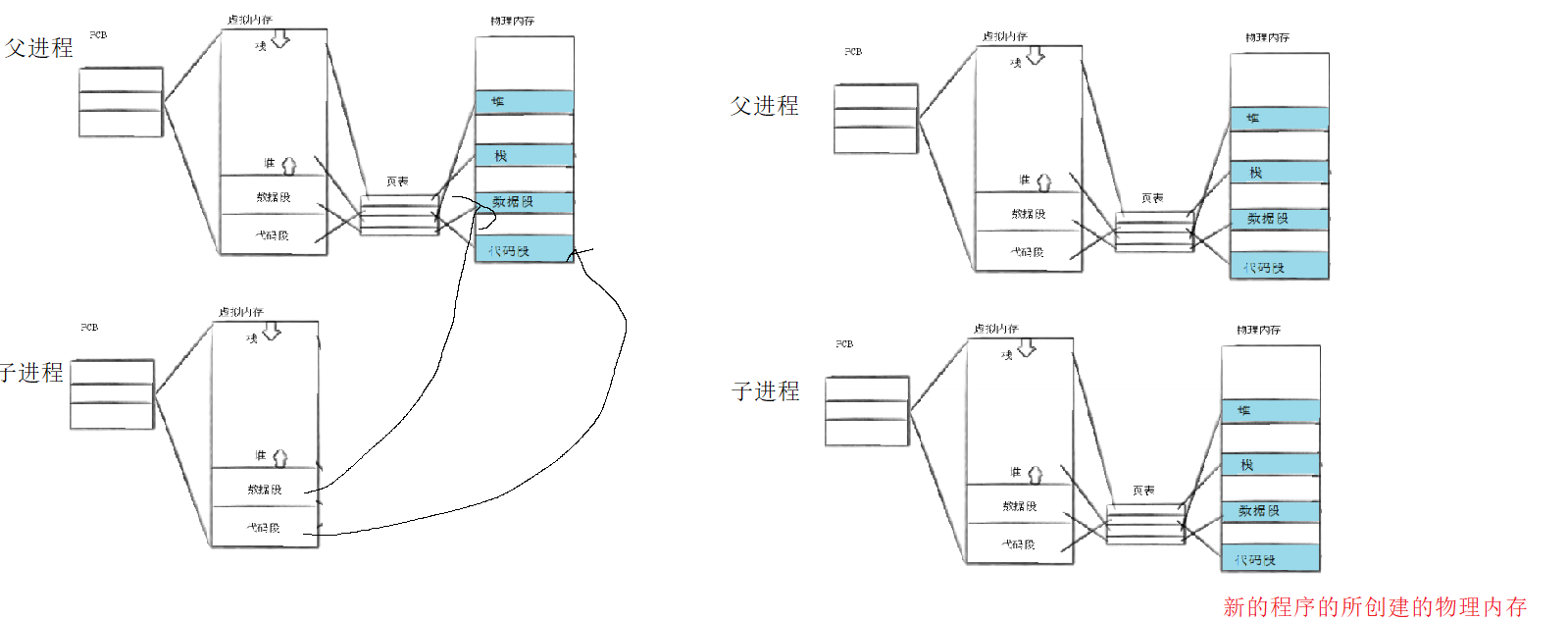
那么问题来了!!!
这个过程有没有创建新的进程呢?
答:我们肯定没有创建新的进程,只不过让子进程执行了新的程序
为什么要进行程序替换
我们一般在服务器设计(linux编程)的时候,往往需要子进程干两件种类的事情
- 1.让子进程执行父进程的代码片段(服务器代码)
- 2.让子进程执行磁盘中的一个全新的程序(shell,想让客户端执行对应的程序,通过我们的进程,执行其他人写的进程的代码等等)
例如我们用C语言的进程去掉java/python/C++等等的程序。
如何进行程序替换
由OS完成,所以我们要调用系统接口。
首先带大家来看看系统接口有什么!
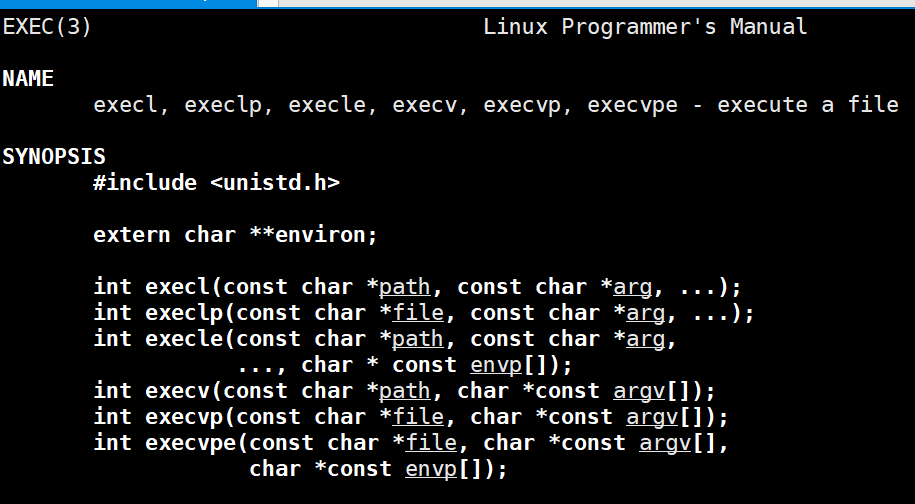
我们如果要执行一个全新的程序,我们需要做几件事情呢?
- 程序本质就是一个磁盘上的文件,所以我们需要先找到这个程序在哪里
- 程序可能携带选项进行执行(也可以不携带),然后告诉OS,我要怎么执行这个程序?(要不要带选项)
使用接口
execl

其中参数列表中:“…” 叫做可变参数,说白了就是可以按照用户的意愿传入参数的大小个数,如果还不理解,大家肯定都用过C语言中的printf函数吧,printf有没有规定你只能打印几个参数呢?没有的,这是根据用户自己来定义的!这就是可变参数

执行完以上的代码,我们发现一个问题!!!
最后一句代码为什么没有被打印出来呢???
因为进程一旦替换成功,是将当前进程的代码和数据全部替换了!!!
后面的printf是代码吗??有没有被替换呢??当然,已经早就被替换了!!该代码不存在了!!
所以这个程序替换函数,用不用判断返回值?为什么?
答:不用判断返回值,因为只要成功了,就不会有返回值。而失败的时候,必然会继续向后执行!!最多通过返回值得到什么原因导致的替换失败!
引入进程创建
#include<stdio.h>
#include<unistd.h>
#include<stdlib.h>
#include<stdlib.h>
#include<sys/wait.h>
#include<sys/types.h>
int main()
{
printf("我是一个进程: %d\n",getpid());
pid_t id=fork();
if(id==0)
{
printf("我是子进程,我的pid是:%d\n",getpid());
execl("/usr/bin/ls","ls","-l","-a",NULL);
exit(1);
}
int status=0;
pid_t ret=waitpid(id,&status,0);
if(ret==id)
{
sleep(2);
printf("父进程等待成功!\n");
}
return 0;
}
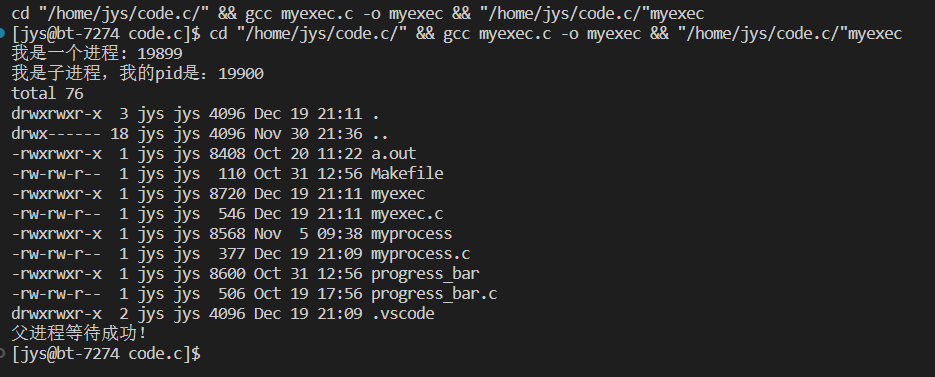
子进程进行程序替换的时候会不会影响父进程呢?
答:不会,因为进程具有独立性。
为什么?如何做到的?
因为数据层面发生了写时拷贝!当程序替换的时候,我们可以理解成为,代码和数据都发生了写时拷贝,完成了父子的分离。
execv
他的第二个参数是一个指针数组,他和execl的区别就是把选项作为参数放入指针数组,然后进行传参!
int main()
7 {
8 printf("我是一个进程,我的pid是:%d\n",getpid());
9 pid_t id=fork();
10 if(id==0)
11 {
12 //child
13 //我们想让子进程执行新的程序,以前是执行父进程的代码片段
14 printf("我是子进程,我的pid是:%d\n",getpid());
15 char *const argv_[]={
16 (char*)"ls",
17 (char*)"-a",
18 (char*)"-l",
19 NULL
20 };
21 execv("/usr/bin/ls",argv_);
22 exit(1);
23 }
24 //一定是父进程
25 int status=0;
26 int ret=waitpid(id,&status,0);
27 if(ret==id)
28 {
29 sleep(2);
30 printf("父进程等待成功!\n");
31 }
32
33 return 0;
34 }
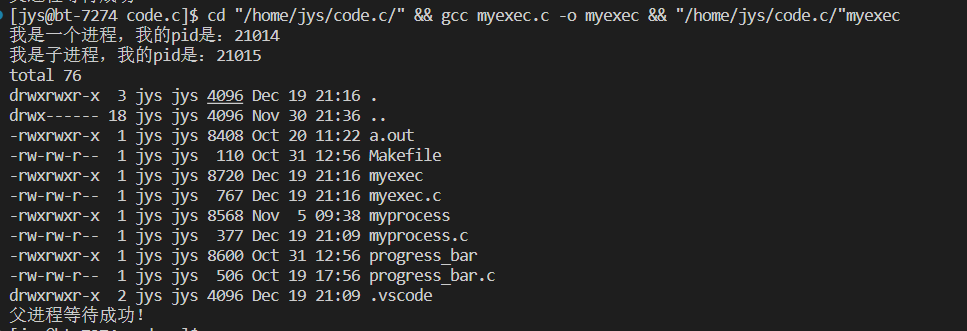
区分execl和execv
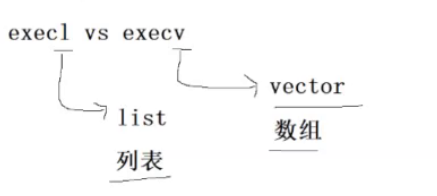
execlp

相比于execl这个接口的第一个参数变化。
我们执行指令的时候,默认的搜索路径,在哪里搜索呢?
环境变量PATH!
p代表PATH
所以命名中带p的,可以不带路径,只要说出你要执行哪一个程序即可!
#include<stdio.h>
#include<unistd.h>
#include<sys/wait.h>
#include<stdlib.h>
int main()
{
printf("我是一个进程,我的pid是:%d\n",getpid());
pid_t id=fork();
if(id==0)
{
//child
//我们想让子进程执行新的程序,以前是执行父进程的代码片段
printf("我是子进程,我的pid是:%d\n",getpid());
char *const argv_[]={
(char*)"ls",
(char*)"-a",
(char*)"-l",
NULL
};
execlp("ls","ls","-a","-l",NULL);//这里出现了两个ls,含义一样吗?不一样!
exit(1);
}
//一定是父进程
int status=0;
int ret=waitpid(id,&status,0);
if(ret==id)
{
sleep(2);
printf("父进程等待成功!\n");
}
return 0;
}
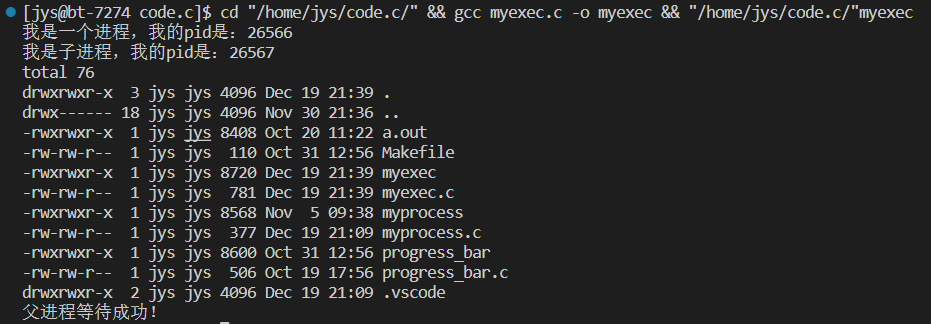
execvp

#include <stdio.h>
#include <sys/types.h>
#include <stdlib.h>
#include <unistd.h>
int main()
{
printf("我是一个进程,我的pid是:%d\n", getpid());
pid_t id = fork();
if (id == 0)
{
// child
// 我们想让子进程执行新的程序,以前是执行父进程的代码片段
printf("execvp 我是子进程,我的pid是:%d\n", getpid());
char *const argv_[] = {
(char *)"ls",
(char *)"-a",
(char *)"-l",
NULL};
execvp("ls", argv_);
exit(1);
}
// 一定是父进程
int status = 0;
int ret = waitpid(id, &status, 0);
if (ret == id)
{
sleep(2);
printf("父进程等待成功!\n");
}
return 0;
}
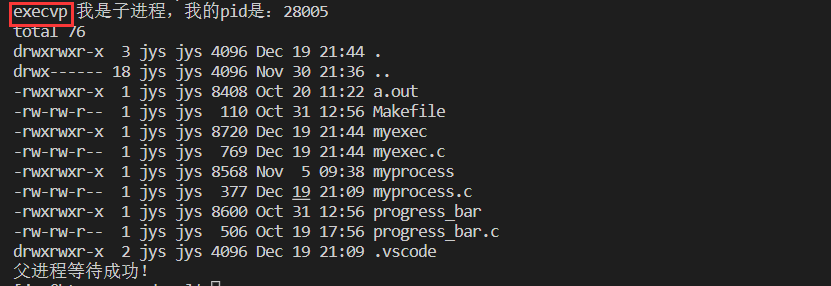
execle

这里的前两个接口都非常熟悉了,这里最后一个接口叫做环境变量。那么为什么要有这个接口呢?
说到环境变量之前我们先来看一下这个问题,我们刚刚提到过,进程替换可以让我们执行其他语言写的程序,那么我们怎么来执行呢?(我们使用execl 函数来调用)
我们现在的目标是想用我们写的myexec.c把mycmd.cpp调用起来,那么怎么来用呢?
myexec.c
#include <stdio.h>
#include <sys/types.h>
#include <stdlib.h>
#include <unistd.h>
int main()
{
printf("我是一个进程,我的pid是:%d\n", getpid());
pid_t id = fork();
if (id == 0)
{
// child
// 我们想让子进程执行新的程序,以前是执行父进程的代码片段
printf("execl 运行mycmd 我是子进程,我的pid是:%d\n", getpid());
/*char *const argv_[] = {
(char *)"ls",
(char *)"-a",
(char *)"-l",
NULL};*/
execl("/home/jys/code.c/mycmd", "mycmd",NULL);
exit(1);
}
// 一定是父进程
int status = 0;
int ret = waitpid(id, &status, 0);
if (ret == id)
{
sleep(2);
printf("父进程等待成功!\n");
}
return 0;
}
mycmd.cc
#include <iostream>
using namespace std;
int main()
{
cout << "你调用了我,很好,你成功引起了我的注意" << endl;
cout << "你调用了我,很好,你成功引起了我的注意" << endl;
cout << "你调用了我,很好,你成功引起了我的注意" << endl;
cout << "你调用了我,很好,你成功引起了我的注意" << endl;
cout << "你调用了我,很好,你成功引起了我的注意" << endl;
cout << "你调用了我,很好,你成功引起了我的注意" << endl;
return 0;
}

我们当前使用的是绝对路径来吊用我的mycmd程序!
当然我们也可以使用相对路径来调用。
所以我们使用ece系列的系统级函数可以把任何语言耦合在一起!
谈完这个话题我们再来谈谈环境变量,execle这个函数多了一个e,这个e就是环境变量,如果你想给这个函数传入环境变量,我们就可以传入环境变量。

myexec.c
#include <stdio.h>
#include <sys/types.h>
#include <stdlib.h>
#include <unistd.h>
int main()
{
extern char** __environ;
printf("我是一个进程,我的pid是:%d\n", getpid());
pid_t id = fork();
if (id == 0)
{
// child
// 我们想让子进程执行新的程序,以前是执行父进程的代码片段
printf("execle 运行mycmd 我是子进程,我的pid是:%d\n", getpid());
execle("/home/jys/code.c/mycmd", "mycmd",NULL,__environ);
exit(1);
}
// 一定是父进程
int status = 0;
int ret = waitpid(id, &status, 0);
if (ret == id)
{
sleep(2);
printf("父进程等待成功!\n");
}
return 0;
}
mycmd.cc
#include <iostream>
#include<cstdlib>
using namespace std;
int main()
{
cout<<getenv("USER")<<"\n";
cout << "你调用了我,很好,你成功引起了我的注意" << endl;
cout << "你调用了我,很好,你成功引起了我的注意" << endl;
cout << "你调用了我,很好,你成功引起了我的注意" << endl;
cout << "你调用了我,很好,你成功引起了我的注意" << endl;
cout << "你调用了我,很好,你成功引起了我的注意" << endl;
cout << "你调用了我,很好,你成功引起了我的注意" << endl;
return 0;
}
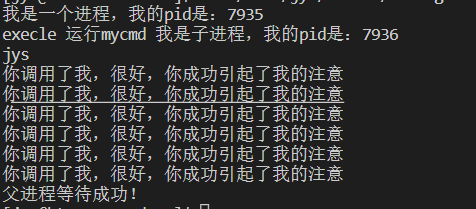
这个是父进程用extern继承了系统的环境变量,子进程继承了父进程的环境变量
#include <stdio.h>
#include <sys/types.h>
#include <stdlib.h>
#include <unistd.h>
int main()
{
// extern char** __environ;
printf("我是一个进程,我的pid是:%d\n", getpid());
pid_t id = fork();
if (id == 0)
{
// child
// 我们想让子进程执行新的程序,以前是执行父进程的代码片段
printf("execle 运行mycmd 我是子进程,我的pid是:%d\n", getpid());
/*char *const argv_[] = {
(char *)"ls",
(char *)"-a",
(char *)"-l",
NULL};*/
char* const env_[]={(char*)"MYPATH=迪丽热巴我老婆\n",NULL};
execle("./mycmd", "mycmd",NULL,env_);
exit(1);
}
// 一定是父进程
int status = 0;
int ret = waitpid(id, &status, 0);
if (ret == id)
{
sleep(2);
printf("父进程等待成功!\n");
}
return 0;
}

#include <iostream>
#include<cstdlib>
using namespace std;
int main()
{
cout<<getenv("MYPATH")<<"\n";
// cout<<getenv("USER")<<"\n";
cout << "你调用了我,很好,你成功引起了我的注意" << endl;
cout << "你调用了我,很好,你成功引起了我的注意" << endl;
cout << "你调用了我,很好,你成功引起了我的注意" << endl;
cout << "你调用了我,很好,你成功引起了我的注意" << endl;
cout << "你调用了我,很好,你成功引起了我的注意" << endl;
cout << "你调用了我,很好,你成功引起了我的注意" << endl;
return 0;
}

这里我们发现我们导入的环境变量出现了!
我们很好奇为什么呢?依照上面两个实验我们可以得出什么结论呢?
我们可以得出execle添加环境变量给目标程序的时候是覆盖式传入的!!
我们自己传入系统的环境变量给我们程序替换的程序
#include <stdio.h>
#include <sys/types.h>
#include <stdlib.h>
#include <unistd.h>
int main()
{
extern char** __environ;
printf("我是一个进程,我的pid是:%d\n", getpid());
pid_t id = fork();
if (id == 0)
{
// child
// 我们想让子进程执行新的程序,以前是执行父进程的代码片段
printf("execle 运行mycmd 我是子进程,我的pid是:%d\n", getpid());
/*char *const argv_[] = {
(char *)"ls",
(char *)"-a",
(char *)"-l",
NULL};*/
//char* const env_[]={(char*)"MYPATH=迪丽热巴我老婆\n",NULL};
execle("./mycmd", "mycmd",NULL,__environ);
exit(1);
}
// 一定是父进程
int status = 0;
int ret = waitpid(id, &status, 0);
if (ret == id)
{
sleep(2);
printf("父进程等待成功!\n");
}
return 0;
}






![[附源码]计算机毕业设计Python二次元信息分享平台的设计及实现(程序+源码+LW文档)](https://img-blog.csdnimg.cn/a1e0b9412f66417bab38803a07deba9a.png)
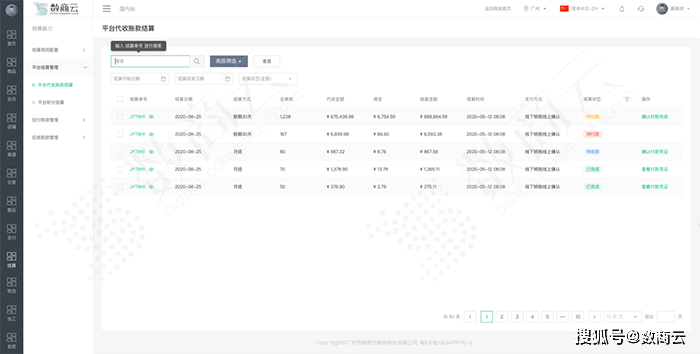
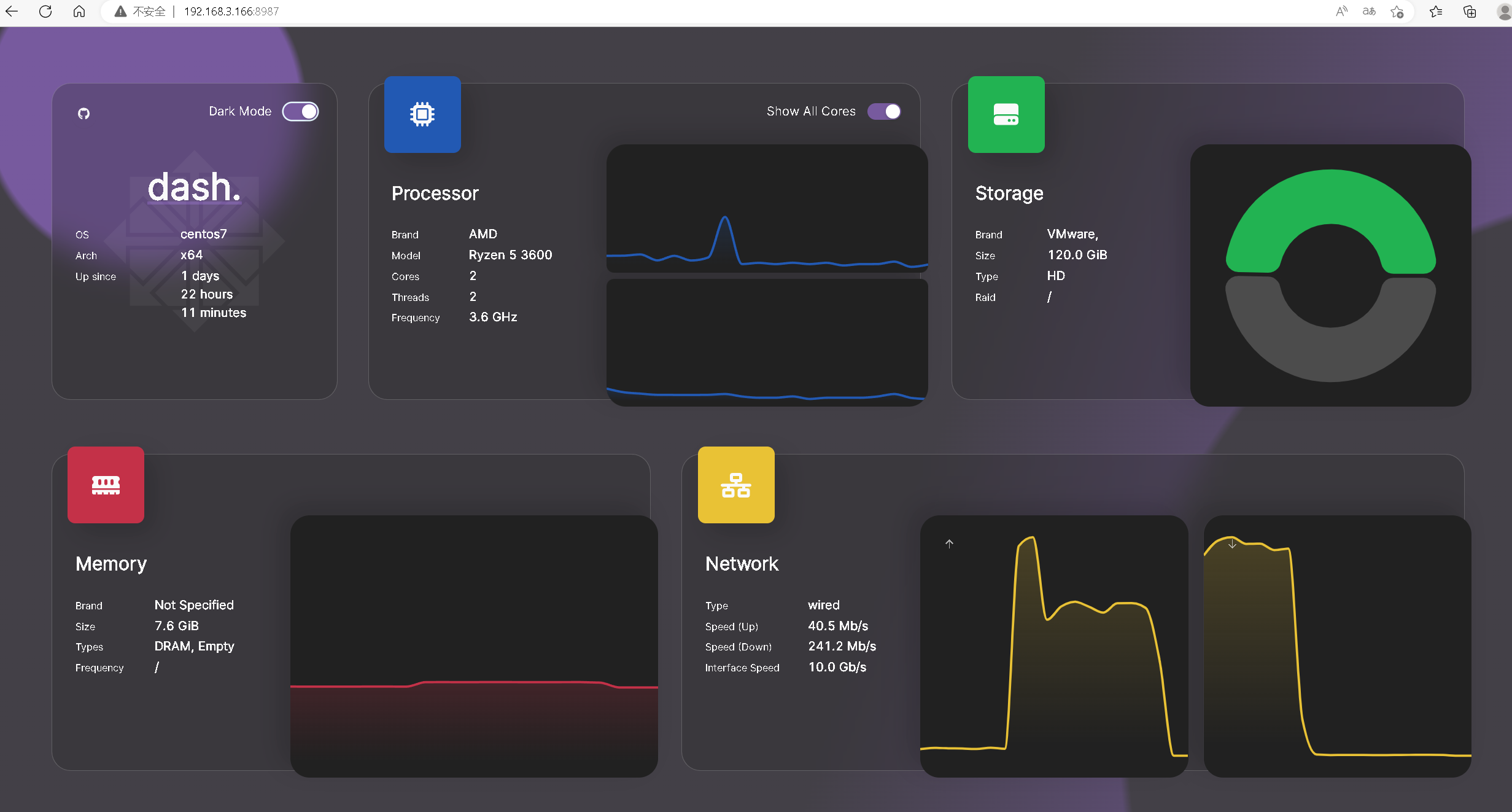

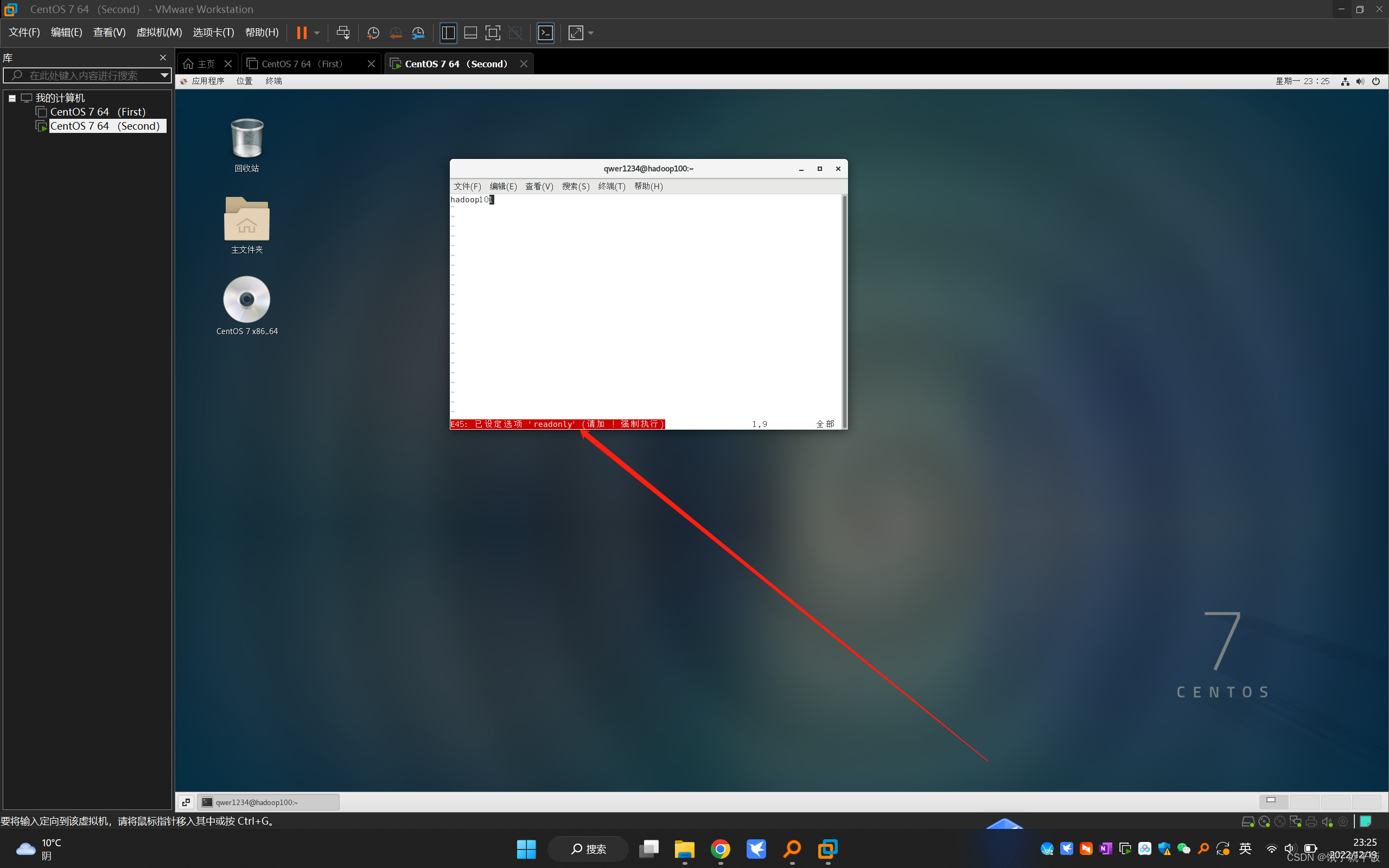
![[附源码]计算机毕业设计Python防疫物资捐赠(程序+源码+LW文档)](https://img-blog.csdnimg.cn/8ca8205cf88943c4ac4902094668161a.png)
![[附源码]计算机毕业设计Node.jswai音乐网站(程序+LW)](https://img-blog.csdnimg.cn/416954035b7c4bd09a5a25d27fb7f49a.png)


